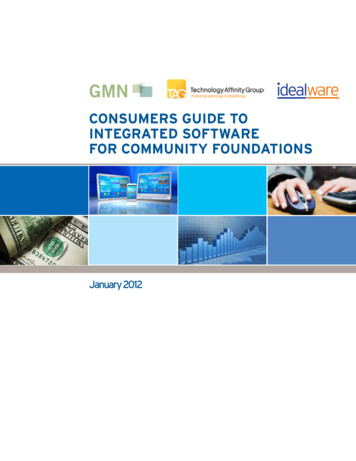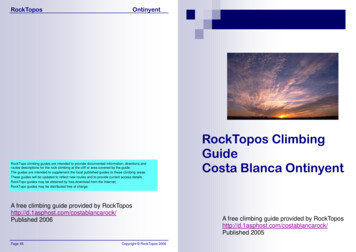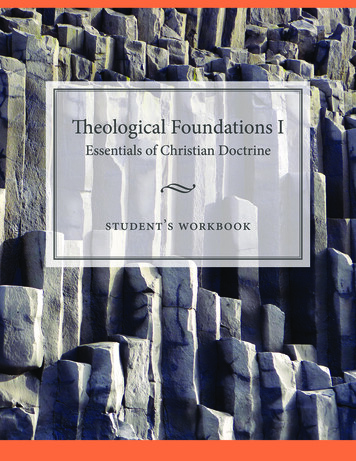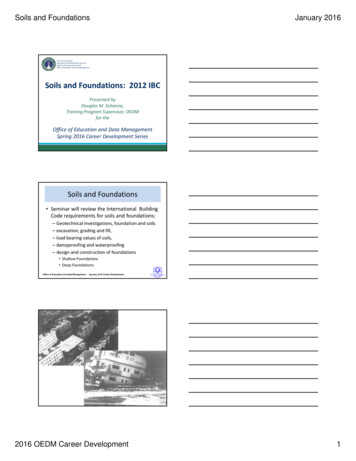
Transcription
Faith Foundations Study GuidesThe Grace of GodA Journey of Discovery in the Book of Romans
Alan Perkins 1993, 2020All rights reserved. Printed in U.S.A.Scriptures taken from the Holy Bible, New International Version , NIV Copyright 1973, 1978, 1984, 2011 by Biblica, Inc. Used by permission. All rights reserved worldwide.“Biblica”, “International Bible Society” and the Biblica Logoare trademarks registered in the United States Patent and Trademark Officeby Biblica, Inc. Used with permission.
How to Use This BookWelcome to the Faith Foundations study guide onRomans! Whether you are just beginning your newlife with Christ, or have been a Christian for manyyears, this study guide is for you. It is designed to helpyou discover, through personal study and groupdiscussion, the incredible riches of God’s Word, andto help you grow in your walk with God by applyingwhat you learn. This book is divided into 26 lessons,each of which contains the full NIV text of theScripture passage, several study and discussionquestions, and a verse-by-verse commentary. So,together with a Bible to look up cross-references, youhave everything you need for your "journey ofdiscovery" in Romans.Why Small Groups?These materials can be used profitably inpersonal study or in an adult Sunday School class.But their value will be best realized when they areused in small groups, meeting either at churchduring the Sunday School hour or in homes duringthe week. There are several reasons for this.First, no one has perfect insight into everypassage of Scripture; we can all benefit fromhearing the perspectives of other believers as weseek to understand and apply the Bible. A smallgroup gathering, using the discussion questionsincluded in this book, is an ideal way to stimulate asharing of observations and ideas.Second, a small group provides a community offellow travelers who, along with us, are seeking tofollow Christ in the midst of family responsibilities,job pressures, and personal struggles. In today’sfragmented and mobile society, the natural networksof neighborhoods and family no longer provide thesupport they once did. We need some way of makingconnections with others for mutual support, peoplewith whom we can share our joys and sorrows—people who will listen, who will pray with us, whowill offer a helping hand and a word ofencouragement, and who will confront us in lovewhen we’ve gotten off track.Finally, a small group combines the benefits ofBiblical insight and community support by keepingus accountable. If we only study the Scripturesalone, or listen to them taught in a large group, it’seasy to let them go "in one ear and out the other".But when a small group of people are learning thesame things at the same time, they can help oneanother to apply the things they are learning.How Are the Groups Organized?The groups should be composed of 6-14 people:if they are smaller, any absences can make itdifficult to maintain the discussion; if they arelarger, not everyone can participate. You can meetfrom two to four times a month; if the group meetsless than twice a month, the members aren’tspending enough time together to build relationships.Some groups find that meeting three times a monthduring the school year, with a break during thesummer, provides a good rhythm of involvement andtime off.You may choose to include a mix of married andsingle, older and younger members, or you mayorganize your groups by age or marital status.There are benefits to homogeneous groups inwhich the members are going through similar lifeexperiences, but there are also benefits of a diversegroup in which the younger members can benefitfrom the experience of the older.Each group needs to have a recognized leader,preferably one selected and trained by the pastor orchurch leadership. This person’s role during themeeting is not primarily to teach (althoughpreparation of the lesson is a must), but to guide thediscussion and keep the group from getting boggeddown on side issues. He or she does not need to bethe host; in fact, it is preferable that groupresponsibilities, such as providing a home in whichto meet and organizing refreshments, be sharedamong the members.Finally, membership in the group should bebased on three commitments: To prepare for eachmeeting by completing the lesson in advance,which takes from 1/2 to 2 hours (but come to themeeting even if you haven’t done the lesson); toplace a high priority on regular attendance andcome to the meetings except in case of emergency;and to keep confidential anything of a personalnature which is shared during the meetings (exceptwhen it is necessary to communicate concerns tothe pastor).What Is the Group Meeting Like?Each group meeting should last from 1 1/2 to 2hours, and provide time for discussion of thelesson, prayer, and fellowship. A problem in manygroups is for the lesson to take up most of the time,with only a few minutes left over for prayer andfellowship. This must be avoided for the goal ofbuilding relationships to be achieved.Here is a suggested schedule:15 minutes:Gathering30-45 minutes: Discussion of the lesson20-30 minutes: Prayer15-30 minutes: RefreshmentsAs for child care, experience has shown that inorder to receive the maximum benefit from timespent in the meeting, all members of the groupneed to be free to focus on the discussion, ratherthan caring for children. Therefore, with thepossible exception of infants under one year,parents should make arrangements for child careduring the meetings. Some options include"trading" child care with parents whose groupmeets on a different night, having a baby sitter carefor children in another room during the meeting, orproviding child care for all the groups at the church.
Introduction to RomansImportanceThe importance of this book has perhaps best beensummarized by Martin Luther, in the preface to hisNotes on Romans: "This Epistle is the chief book ofthe New Testament, the purest gospel. It deserves notonly to be known word for word by every Christian,but to be the subject of his meditation day by day."Luther also spoke of it as "a light and way into thewhole Scriptures."AuthorIt is almost universally agreed that the author ofRomans is Paul the apostle. Not only is he identifiedas such in the letter (1:1, 5), but both the external andinternal evidence testify clearly to his authorship. Theletter is referred to as Paul's by the church Fathers (thepastors and theologians of the early church), and theearly lists of New Testament books list Romans as oneof Paul's letters. The internal evidence includes thestrong linguistic and theological similarities to Paul'sother letters.Date and Place of OriginFrom the description Paul gives of his circumstances,it is not difficult to place the writing of Romansrelative to his journeys. He considered his churchplanting work in the Eastern part of the Roman empireto have been completed. He was about to set out forJerusalem with the offerings collected from thechurches of Macedonia and Achaia, before going on toSpain (15:18-28). This corresponds with the threemonths he spent in Greece (i.e. Achaia) after passingthrough Macedonia (Acts 20:1-3; 24:17) during histhird missionary journey. The possible dates for thistime can be narrowed to A.D. 54-59, based on theevents of Roman history which form the politicalbackground of Acts.It is likely, in view of Paul's close relationshipwith the Corinthian church, that he spent these threemonths in Corinth, the capital of the province ofAchaia. The commendation of Phoebe, a "servant ofthe church in Cenchrea" (Rom. 16:11) points toCorinth, as Cenchrea was Corinth's eastern port, andthe Gaius mentioned in Rom. 16:23 may be the sameone baptized by Paul in Corinth (1 Cor. 1:14).RecipientsThe recipients of this letter were the believers inRome, whom Paul had never visited (1:7, 10). Thechurch consisted of both Jewish and Gentile Christians(15:7-12). Since there is no mention in Acts or any ofthe epistles of missionaries being sent to Rome, it waslikely founded by ordinary Christians in the course oftheir travels.Occasion and PurposeThe occasion of the letter, as Paul indicates, is his planto visit Rome and to spend some time in fellowshipwith the believers there, ministering to them and beingministered to by them, before proceeding on to Spain(1:18-16; 15:14-33). Paul's purposes in writing theletter include the following: (1) informing the RomanChristians of his plans to visit them, (2) informingthem of his plans to go to Spain, possibly with a viewto securing their support, (3) soliciting their prayers(15:30-32). However, these purposes do not explainthe content of the main portion of the letter (1:16b15:13).Why did he choose this letter to present such anextended treatment of the central doctrines of theChristian faith? One explanation is that Paul, havingnever visited the Roman church, chose to introducehimself to them in a way which highlighted his identityand purpose as an apostle, through a presentation of thegospel which he had been preaching during the manyyears of his labors. The relative length andcompleteness of the presentation may be due to the sizeand importance of this church. Perhaps Paul was alsomotivated by a desire to set down in comprehensiveform a statement of his mature thinking and reflectionon the gospel, not only for the benefit of the church atRome, but for the greater Christian community as well.SummaryAfter identifying justification by faith as the themeof the letter in 1:16-17, Paul first lays out the causeof man's utter alienation from God--his sin. No manis righteous before God, but rather "Jews and Gentilesalike are all under the power of sin" (3:9). In light ofthis fact, the righteousness which comes from Godthrough faith in Christ is the only means ofjustification (3:21-31). Abraham is no exception, forhe also was justified by faith rather than works (4:125).The life which results from justification isdescribed in 5:1-8:39. It is a life characterized bypeace with God, due to our separation from Adam andunion with Christ (5:1-21); a life characterized byobedience, since our justification, rather than giving uslicense to sin, actually frees us from the tyranny of sin(6:1-7:25); a life characterized by the indwelling of theSpirit and the certainty that the possibility ofcondemnation for the believer has been foreverabolished (8:1-39).Paul then discusses the status of the Jewishpeople before God, arguing that their rejection ofChrist does not indicate the failure of God's promises.Rather, it reveals that God's promises apply only tothose who are sons of Abraham through faith,demonstrating that salvation is according to thesovereign will of God. Although Israel has been cutoff from God due to unbelief, her rejection is not final.Finally, Paul exhorts his readers to fulfill theduties of obedience to which Christians are called andconcludes with greetings to individuals.
Unit 1 – SalutationRomans 1:1-7Text1Paul, a servant of Christ Jesus, called to be anapostle and set apart for the gospel of God—2the gospel he promised beforehand through his3prophets in the Holy Scriptures regarding hisaSon, who as to his earthly life was a descendant4of David, and who through the Spirit of holinessbwas appointed the Son of God in power by hisresurrection from the dead: Jesus Christ our5Lord. Through him we received grace andapostleship to call all the Gentiles to thecobedience that comes from faith for his name’s6sake. And you also are among those Gentileswho are called to belong to Jesus Christ.7To all in Rome who are loved by God and calledto be his holy people:Grace and peace to you from God our Father andfrom the Lord Jesus Christ.abc3 Or who according to the flesh4 Or was declared with power to be the Son of God5 Or that isOpen This is a chance to get to know the other group members better. Have everyone introduce themselvesand answer this question: What was your nickname growing up, and how did you get it?Discover1.Key words are those which, because of emphasis or repetition, stand out as being central to themessage of the passage. What are some key words or phrases in this passage?2.(a) What do you think of when you hear the word "servant"?(b) What is Jesus’ attitude toward being a servant? (Mark 10:43-45; Luke 22:24-27)(c) How do the attitudes of Paul (v. 1) and Jesus toward servanthood differ from those of most people?3.What can you learn about the gospel (literally, "good news") from this passage? (vv. 2-3)4.Why does it matter that the gospel of Jesus Christ was anticipated in the Old Testament? (v. 2; seeLuke 24:25-27; Acts 26:22-23)
5.Word study - "called". The goal of a word study is to understand the meaning of a word in a specificpassage by examining how it is used in other places in the Bible.(a) For each of the following verses, briefly state the purpose of God's call.Romans 1:5, 6, 7Romans 8:28-301 Corinthians 1:9Colossians 3:152 Thessalonians 2:141 Timothy 6:121 Peter 3:8-91 Peter 2:20-211 Peter 5:10(b) What does 2 Timothy 1:8-9 tell us about God's call?(c) In light of your word study, what does Paul's use of the word "call" in verses 5-7 tell us about ourrelationship with Christ?6.What can you learn about Jesus from this passage? (vv. 3-4)7.Why do you think Paul specifies that Jesus' descendancy from David was "as to his earthly life"? (v.3)8.What does Jesus' resurrection reveal about him? (v. 4; see Acts 2:22-36)9.Why is it significant that Paul received his apostleship from God? (vv. 1, 5)10. What people were the primary "target audience" of Paul's ministry?Apply Do you think of yourself as a servant ofChrist? Of other people? How does your lifereflect this attitude, or lack of it? How did God call you to belong to JesusChrist? How is your life different as aresult?
Commentaryvv. 1-7Paul writes his introduction in the formcommon to letters in his day; this includedthe name of the sender, the name of therecipient, and a greeting. However, thegreetings in Paul's letters are longer thannormal, because he often uses them tocommunicate some aspect of the gospel(see the introduction to 1 Corinthians foran example). This one is rather formal incomparison with his other letters.v. 1“a servant of Christ Jesus” The wordtranslated "servant" here, doulos, is alsoused of a literal slave (see Eph. 6:5-9).For the people of Paul's time, freedom andindependence were highly prized; it wouldbe unusual for someone to willingly referto himself as a servant or slave. But Paulhas a different attitude, as reflected also in1 Cor. 9:19 and 2 Cor. 4:5.“called to be an apostle” The basicmeaning of apostle is that of a messengeror representative, one who is sent out witha purpose. Paul here stresses that he wasnot a self-appointed apostle, nor oneappointed by men, but rather by God (seealso the account of his call in Acts 9:1-19and Galatians 1:11-24). At times, he felt itnecessary to defend his apostleship, as in2 Cor. 12:11-12 and Galatians 1:1.“set apart for the gospel of God” Wetypically think of being "set apart" asnegative—being separated fromsomething. But Paul uses it here in apositive sense, to be separated to thegospel. This separation includes his workof preaching the gospel, but also refers tothe fact that his whole life is influencedand controlled by the "good news".v. 2“the gospel he promised beforehand”Paul here emphasizes that the gospel ispart of God's eternal purpose. The factthat it is a fulfillment of Old Testamentprophecy shows that God can be trusted,because He keeps His promises, and alsothat the gospel of Jesus Christ is true,because it comes from the same Godwhose acts in history are recorded in theOld Testament (see Luke 24:25-27; Acts26:22-23).v. 3“regarding his Son” The gospel isessentially concerned with the person andworks of Jesus Christ, especially his deathand resurrection.“who as to his earthly life was adescendant of David” Jesus wasqualified to fulfill the Old Testamentprophecies concerning the Messiah, or"anointed one," because he was from theroyal line of Israel's King David. Thephrase "as to his earthly life" carries theimplication that his life extended beyondthis world.v. 4Jesus' resurrection from the deaddemonstrated once and for all that He isboth the Son of God and our Lord, asPeter's sermon on the day of Pentecostexpresses (Acts 2:22-36). In theSeptuagint, the Greek version of the OldTestament, the proper name for God,Yahweh, was translated "Lord," so thatGreek Christians familiar with the Biblewould likely understand calling Jesus"Lord" to be as a reference to his deity.
v. 5“we received grace and apostleship”Paul tells us several things about hisministry of apostleship ("we" is probably aneditorial "we," referring to Paul only): (a) itcomes from Christ; (b) it was granted forChrist's glory, or his "name's sake"; (c) itwas received by grace; in other words, itwas not earned or deserved in any way;(d) it was given for a purpose, "to callpeople".“to call all the Gentiles” Paul's specialarea of ministry was to the Gentiles, just asthe apostle Peter's was to the Jews (Gal.2:7).“obedience that comes from faith”Paul's mention of obedience as the goal ofhis ministry fits well with his reference tohimself as a servant, since a servant orslave owes his master complete obedience.The order, however, is essential. The faithproduces the obedience, not vice versa.v. 6“And you also are among those Gentileswho are called” Paul reminds his readersthat it is not only apostles who are called byGod, but all believers.v. 7“his holy people” This is another term for"Christians", having the basic meaning ofbeing set apart or separated. It does notrefer to unusually pious or spiritual people.Rather, it highlights the fact that believersbelong to God and are set apart to Him.
Unit 2 – The Gospel — The Power of GodRomans 1:8-17Text8First, I thank my God through Jesus Christfor all of you, because your faith is being reported9all over the world. God, whom I serve in myspirit in preaching the gospel of his Son, is my10witness how constantly I remember you in myprayers at all times; and I pray that now at last byGod’s will the way may be opened for me tocome to you.11I long to see you so that I may impart toyou some spiritual gift to make you strong—12that is, that you and I may be mutually13encouraged by each other’s faith. I do not wantayou to be unaware, brothers and sisters, that Iplanned many times to come to you (but havebeen prevented from doing so until now) in orderthat I might have a harvest among you, just as Ihave had among the other Gentiles.Open When you go on a trip, do you like to planeverything out ahead of time, or just get inthe car and go?14I am obligated both to Greeks and non15Greeks, both to the wise and the foolish. Thatis why I am so eager to preach the gospel also toyou who are in Rome.16For I am not ashamed of the gospel,because it is the power of God that bringssalvation to everyone who believes: first to the17Jew, then to the Gentile. For in the gospel therighteousness of God is revealed—abrighteousness that is by faith from first to last, justcas it is written: “The righteous will live by faith.”a13 The Greek word for brothers and sisters (adelphoi)refers here to believers, both men and women, aspart of God’s family; also in 7:1, 4; 8:12, 29; 10:1;11:25; 12:1; 15:14, 30; 16:14, 17.b17 Or is from faith to faithc17 Hab. 2:4 If you could spend one week anywhere inthe world, and cost were no object, wherewould you go?Discover1.Key words are those which, because of emphasis or repetition, stand out as being central to themessage of the passage. What are some key words or phrases in this passage?2.What reasons does Paul give for wanting to go to Rome? (vv. 11-15)3.Compare verse 14 with 1 Corinthians 9:16-17. In what sense is Paul "obligated"? Do we have anyobligations of this kind? Why or why not?4.Why is Paul not ashamed of the gospel (vv. 16-17)? Why might he feel a need to state this? (see1 Corinthians 1:18-25)5.In what sense is the gospel powerful? (v. 16) How is that power demonstrated?
6.What else can we learn about the gospel from verses 9 and 16-17?7.Topical study - the gospel(a) What does 1 Corinthians 15:1-8 tell us about the content of the gospel message?(b) Look up John 14:6 and Acts 4:12. What do these verses tell us about the gospel? How does thisrelate to Romans 1:16?8.What is the significance of the fact that the righteousness revealed in the gospel is "of God" and is "byfaith from first to last"? (v. 17; see 3:20-21 and Galatians 2:16).9.In what sense is the gospel universal? (vv. 14, 16; see Revelation 5:9; 7:9)In what sense is it limited? (v. 16; see Hebrews 4:2)10. What characteristics of Paul stand out to you from this passage?Apply According to Paul's example, to whomshould we go if we need encouragement?Is this what we usually do? Why? How might this passage affect your attitudetoward the pastor and other churchleaders? Do you ever see the Christian life or yourservice to God as just another obligation orduty? What tends to bring on this attitude?What helps to get rid of it?Have you ever felt "ashamed of thegospel"?
Commentaryvv. 8-15 In this section, Paul assures the RomanChristians that, although he has never metthem, they are constantly in his prayers ashe gives thanks for them and intercedesbefore God on their behalf. Not only that,he eagerly looks forward to visiting themso that he may minister to them in person(a desire which was never fulfilled).v. 8“I thank my God through Jesus Christ”The fact that all human access to God ismediated through Jesus Christ is one ofthe central themes of Romans; Paul hasalluded to this once already, in 1:5. Seealso 1 Tim. 2:5 and Heb. 13:15.“because your faith is being reported”Paul is not commenting here on the qualityof their faith; rather, he gives thankssimply that there are believers at Rome.v. 9“whom I serve in my spirit” Paulemphasizes the depth of his commitmentto serving God. His service is not for thesake of appearances or to gain men'sapproval; rather, it comes from the core ofhis being.“God . . . is my witness how constantlyI remember you” Paul seeks to assurehis readers of the sincerity of his concernfor them. Not only does he pray for themconstantly and at all times, but heemphasizes the truth of this statement bycalling on God Himself as a witness.v. 10 “now at last by God's will” Even thoughhe strongly desires to see them, Paulrecognizes that as a servant (1:1) hisplans are subject to God's overruling. It isGod's will, not his own, which mustdetermine whether his desire is fulfilled.This is not merely an acceptance of "fate",but a trusting reliance on the One whocontrols the future. See James 4:15.v. 11 “so that I may impart to you somespiritual gift to make you strong”Paul here reveals his motives for desiringto visit the Roman Christians--that hemight build them up in the faith. Paulwishes to strengthen them by imparting, orsharing his gifts with them--that is, byexercising his gifts of ministry amongthem. The Greek word charisma, or gift, isused in 12:6-8 and in 1 Corinthians 12 todescribe special abilities granted tobelievers by the Holy Spirit for service. It isalso used in Romans 5:15-16 and 6:23 todescribe the gift of salvation.v. 12 “that you and I may be mutuallyencouraged by each other's faith”Paul graciously and humbly clarifies hismeaning. It is not as though the blessingwould all be in one direction; rather, bothPaul and the Romans would beencouraged by one another's faith as theyministered to one another. As Paul'sexample shows, even the most giftedleaders need to allow themselves toreceive encouragement and ministry fromothers.v. 13 Paul emphasizes that the absence of avisit so far is not from indifference: he hadactually made plans to see them, but wasunable to carry them out. He desires tohave a harvest among them. This phrasetranslated literally means "get some fruit".Paul refers to "fruit" in other places todescribe the changes in the life of thebeliever brought about by the Holy Spirit(Gal. 5:22; Col. 1:10). Here he seems tobe referring generally to the anticipatedbeneficial effects of his ministry amongthem, including salvation (vs. 16).
vv. 14-15 God gave Paul a special responsibilityto the Gentiles (non-Jews); see Acts 9:15and Gal. 2:7-9. He was obligated by thecommission he had been given at the timeof his conversion (Acts 9:1-19). Hisobligation was not only to the wise andcultured, but also to the foolish anduncultured. Paul seems to be diplomaticallyexplaining why he has not come sooner toRome, the capital city of the Roman empire.v. 16 Paul states that he is not ashamed of thegospel; perhaps he was concerned that theRomans would interpret his lack of a visit asindicating he was ashamed of his message.Paul certainly knew that the simplicity of thegospel was looked down on by those whoconsidered themselves wise; see1 Cor. 1:18-25 and 2:14. Jesus alsowarned about this in Mark 8:38.“it is the power of God” The Greek wordtranslated "power" is dunamis, from whichwe get words like "dynamic" and"dynamite". The gospel of Jesus Christ isnot merely advice to people about how tolive better, it is power, the power of God.“that brings salvation” The power of Godwhich operates in the gospel is not randomor purposeless; instead, it has a specificgoal and result--salvation.“to everyone who believes” The gospelis both universal and limited. It is universalin that the same good news is for everypeople-group, every "tribe and languageand people and nation" (Rev. 5:9). It islimited in that it is only effective for thosewho believe (see Heb. 4:2).v. 17 “the righteousness of God . . . that is byfaith” The way to have a right standingbefore God is not through personalachievement, nor through good deeds, butthrough receiving in faith what God offersus. Righteousness is not something whichcomes from ourselves, but from God.“is revealed” the gospel is not somethingthat could have been discovered by man.Who would have ever thought that God, inorder to bring man into fellowship withHimself, would send His own Son to sufferand die in our place? It could only havebeen known to us if God revealed it.It is by faith from first to last; that is, byfaith through and through. Righteousnessdoes not come from intellectual agreementwith the facts of Jesus' life, or fromattempting to live according to the principlesJesus taught. It comes from recognizingour own inability to live up to God'sstandards, and trusting in God's offer tocredit Christ's righteousness to our account.“The righteous will live by faith” Oneway to read this is that "He who is righteousby faith shall live," and this seems to agreewith the context. Paul is saying that theone who becomes righteous by faith willhave eternal life.
Unit 3 – God’s Wrath Against MankindRomans 1:18-32Text18First, The wrath of God is being revealedfrom heaven against all the godlessness andwickedness of people, who suppress the truth by19their wickedness, since what may be knownabout God is plain to them, because God has20made it plain to them. For since the creation ofthe world God’s invisible qualities—his eternalpower and divine nature—have been clearlyseen, being understood from what has beenmade, so that people are without excuse.21For although they knew God, they neitherglorified him as God nor gave thanks to him, buttheir thinking became futile and their foolish22hearts were darkened. Although they claimed23to be wise, they became fools and exchangedthe glory of the immortal God for images made tolook like a mortal human being and birds andanimals and reptiles.24Therefore God gave them over in the sinfuldesires of their hearts to sexual impurity for thedegrading of their bodies with one25another. They exchanged the truth about Godfor a lie, and worshiped and served createdthings rather than the Creator—who is foreverpraised. Amen.Open Do you enjoy getting back to nature, or isyour idea of "roughing it" a hotel withoutroom service?26Because of this, God gave them over toshameful lusts. Even their women exchanged27natural sexual relations for unnatural ones. Inthe same way the men also abandoned naturalrelations with women and were inflamed with lustfor one another. Men committed shameful actswith other men, and received in themselves thedue penalty for their error.28Furthermore, just as they did not think itworthwhile to retain the knowledge of God, soGod gave them over to a depraved mind, so that29they do what ought not to be done. They havebecome filled with every kind of wickedness, evil,greed and depravity. They are full of envy,murder, strife, deceit and malice. They are30gossips, slanderers, God-haters, insolent,arrogant and boastful; they invent ways of doing31evil; they disobey their parents; they have nounderstanding, no fidelity, no love, no32mercy. Although they know God’s righteousdecree that those who do such things deservedeath, they not only continue to do these verythings but also approve of those who practicethem. Have you ever had an encounter with thenatural world that was completely aweinspiring?Discover1.What has God revealed to mankind about Himself? How has He done this? (v. 20; see Psalm 19:1-6)2.How should people respond to God as a result of this "natural revelation"? (v. 21)3.What is the result of their failure to respond as they ought? (v. 22)4.What is God's response to the evil acts listed in this passage? (vv. 24, 26, 28) How is this anexpression of wrath? (v. 18)
5.Why do people continue sinning if they know that "those who do such things deserve death"? (v. 32;see vv. 18, 21-22,28)6.Who do you think Paul is writing about in this passage?7.What is mankind's general attitude toward the truth about God? (vv. 18,258.One response to vv. 26-31 would be to think that we are pretty good in comparison to others because weare guilty of only a few of these sins. What do the following passages have to say about that?Matthew 5:21-22, 27-28Romans 3:9-12James 2:10-119.As
Romans! Whether you are just beginning your new life with Christ, or have been a Christian for many years, this study guide is for you. It is designed to help you discover, through personal study and group discussion, the incredible riches of God’s Word, and to help y










